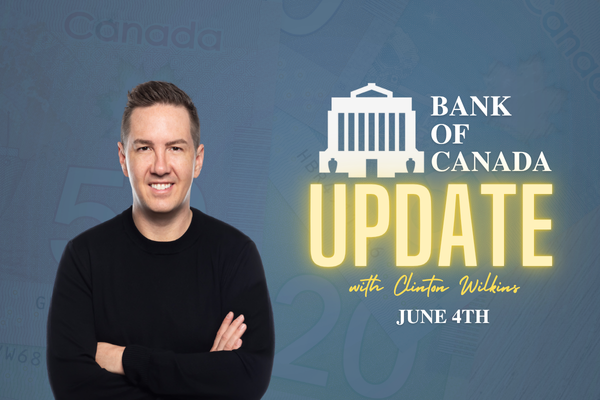Clinton Wilkins joins Todd Veinotte on 95.7 News Radio to discuss The Bank of Canada holding its key policy rate at 2.75%, marking the first pause after seven consecutive cuts.

Clinton Wilkins Special News Update June 7 2024
Clinton Wilkins joins Todd Veinotte, on City News, for a special news update on the recent softening of the Bank of Canada’s overnight key interest rates.
Todd Veinotte
This week, for the first time since 2020, as matter of fact, it was March of 2020, the Bank of Canada has lowered its interest rate to 4.75%, down from 5%. Joining us to discuss all of this, and how it will impact you and your mortgage is our mortgage guru, of course. Clinton Wilkins. Clinton Wilkins, hello! Thanks for coming in!
Clinton Wilkins
Thanks for having me Todd, I love being here on Fridays. We’re gonna make this a little bit of a trend I don’t know.
Todd Veinotte
You love being here any day.
Clinton Wilkins
I really do. That’s true.
Todd Veinotte
That’s right! Okay, so 5% to 4.75%. What does this translate into dollars and cents? Give everybody some numbers.
Clinton Wilkins
3% reduction in the key overnight rate, which really means what’s going on with the bank prime. So, Prime is now going to be 6.95% for most lenders. Some lenders have a higher prime rate, just depending on what their situation is. And the Bank of Canada lowered this key overnight rate by these 25 basis points on Wednesday, and some lenders would take effect right away. Now there are some lenders that will not change their prime rate until the first of July. So depending on who your lender is, it may impact how that interest is being calculated and when it actually is changing. So now, if you do have a variable rate mortgage, a lot of consumers will have their payments go down, which I think is great news, especially in this high inflationary world we’re living in right now, they’ll have a lower payment. But there are some mortgages out there, specifically some of the mortgages from the big five, that have a static payment, and those borrowers will now see a shorter amortization. You know, once the first of July rolls around. It’s good news for consumers. It’s good news for anyone who has a home equity line of credit, because they’re all variable; or any debt product that’s tied to a bank’s prime rate. They’re gonna pay less now than they did early on Wednesday before the announcement came out.
Todd Veinotte
Can you tell us, what does this mean for somebody with the average mortgage? I think it’s $500,000 something roughly like that, right? The average mortgage out there. Let’s use that as a benchmark.
Clinton Wilkins
It’s really a marginal difference. You know, a little bit of this is going to be psychological. 25 basis points, yes, it does move the needle. The amount that it’s going to save, the average consumer is really going to be impacted on what their amortization is and how much they owe. So, it’s hard to say, okay, carte blanche, people are going to save $100 a month, or whatever that number is. It’s going to be different for every consumer. The positive news story is, economists now are projecting that the Bank of Canada is going to continue decreasing the key rate in 25 basis point tranches between now and the end, the end of the year. So they’re really projecting that the next three announcements are going to be reductions. So that means this year, we’re going to be 1% less than we were at the beginning of this year, which is great news for consumers, and I think it’s going to put a lot of confidence into the market. I know on our show Mortgage 101, which airs here on the radio station, we really said that there were a lot of buyers and a lot of mortgage borrowers that were sitting on the sidelines waiting for rates to just be signaled to be lower. And we’re really even feeling that in our office this week. I can tell you, once that announcement happened Wednesday morning, it’s been like wildfire. Clients are getting accepted offers, and a lot of people just looking to transact. And, we were projecting that, and I’m not surprised. And, it doesn’t make a huge difference in a borrower’s cost of borrowing, but it is a good signal that things are going in the right direction. And I think that’s almost more important than the dollars and cents. Yes, it does make a difference. And you know, the one thing that we need to remember, inflation is driven by a lot of different things. And one thing that’s really driving inflation right now is the cost of housing. And by the Bank of Canada lowering this key overnight rate, it’s going to reduce the cost of borrowing for a lot of consumers.
Todd Veinotte
Yeah, the psychology of it, I mean, I would equate it to a lot of things. I mean weight loss, right? If you’ve been gaining weight for a year, for months and months, and you lose a pound, that means something.
Clinton Wilkins
It does! It’s motivating, and it’s going to put more confidence into the market. I can tell you, there’s been a huge shift over even the last couple of months. A lot more consumers are choosing to do a variable rate mortgage again, because economists in general think the rates are going to be 2% less between now and the end of next year. That’s a significant downward trend. And you know, a consumer would take a variable rate mortgage because there are some benefits. One, is a potentially lower rate. Two, they can always convert into a fixed rate at any time with no penalty. Or three, if there’s some uncertainty, they can always break that mortgage early, and it has the lowest cost of penalty, only three months of interest. One thing I should mention is there’s a lot of misconception out there. And I think consumers think when the Bank of Canada lowers the key overnight rate, that somehow has an effect on fixed rates. Fixed rates and variable rates move completely independently of each other. The fixed rates are tied to what’s going on in the bond market, and in theory, the fixed rates could go up even though the Bank of Canada has lowered the key overnight rate. So, it’s great news for consumers that have a variable rate mortgage, or a home equity line, but those of you that are looking to get a fixed rate mortgage, fixed rates have not been impacted. I’m not saying that the bond market might not change down the road, but today, fixed rates are not impacted at all by this change that’s happened. So you know, if you’re planning on doing a mortgage, or if you have a mortgage approval, or if your mortgage coming up for renewal, those fixed rates are not moving. They’re still really the same, by and large, they have been for the last few months. But I do encourage consumers to speak to your unbiased mortgage professional. A variable rate could be right for you. It’s not right for everyone, but it could be right for a lot of people. Historically, 60% of Canadians were taking a fixed rate. And the last few months it’s been obviously a lot different. I would say 90% of consumers have been taking a fixed rate just because the fixed rates have been lower than the variable. But this is certainly a move in the right direction, where we’re getting closer to variable being closer pricing to where the fixed is. And I think now, over the next 18 months, we’re going to see variable rate mortgages being on the right side of things, and they’re going to be more affordable than a fixed rate.
Okay, a recent news story that I saw there was a survey of mortgage brokers in which you took part, and it was a large survey, large sample size, asking mortgage brokers about what products that they thought were best equipped or the most popular, or whatever it might be. And I believe the findings were, the majority said a three year fixed. Correct?
Correct, that is correct. And I’m not surprised, I actually answered the survey saying today, a variable rate mortgage is the most popular. That’s what we’re getting the most inquiries for. And I can tell you, as of Wednesday, a lot more mortgage brokers would be changing their answer. You know, leading up to this rate announcement, yes, a three year fix was probably one of the most popular products. You know, we are more comfortable with the variable rate because, we understand it more. I’m here, and I do a show with Rob snow on City News, that goes across the country, and I give my opinion to consumers, every time the Bank of Canada meets. We’re really in the thick of things, and every consumer is different. And I think that’s really sometimes what we need to remember. Not every product is right for every consumer, not every lender is right for every consumer, and everybody’s situation is different when we look at income, assets and credit. And that’s why, when you’re doing a mortgage, it is a big financial transaction, and you really need to get that expert advice.
Todd Veinotte
Okay, so somebody mentioned to me that usually or often the Bank of Canada will go down by a point five zero instead of the point two five. So this was still quite a hesitant to move, right?
Clinton Wilkins
Well, the one thing that we were even projecting, and I think it’s going to be assumed across the board, is the bank Canada is a biased institution. They are going to be biased to reducing inflation. They’re going to increase rates a lot faster than they’re going to decrease. And we really saw that over the last 18 months, when those rates were going up, they were going up in a lot bigger tranches than maybe on the way down. And, you know, on the way down, I think it’s going to be a slow burn. I think it’s going to be 25 basis points, maybe every rate announcement until they’re really down in the place that they want them to be. The one thing that we need to be cognizant of, the Bank of Canada is going to be watching very closely what happens with inflation. They want to make sure that by reducing this key rate, it’s not going to be inflationary. They want to make sure that consumers are not going to suddenly go out and become more indebted. They want to make sure that they’re not going to put more fuel on the housing market that already is strained in many areas of this country. So, it’s good news, and I think the rates are still going to go down. And I think the rates will be 2% less by the end of next year. When that’s going to happen, we’re certainly going to be continuing to watch. But my estimate is in the July meeting, which is going to be July 24, which is the last Wednesday in July, they’re going to reduce again by 25 basis points. So I guess we’ll be here, we’ll be watching.
Todd Veinotte
Unless something massive changes globally, right?
Clinton Wilkins
And it does! Right now, things are moving in the right direction. Inflation, the numbers are certainly going in the right direction. We’re not at that 2% target that the Bank of Canada really wanted in the beginning, but we’re almost there. We’re moving in the right direction! The thing that we need to remember is, all these rate increases, they don’t just suddenly fix inflation. Inflation may take 3,6,9, months to really come in line as those increases were happening. So it’s a delayed effect. It’s going to be the same thing on the way down. When they reduce the rate, it’s not suddenly going to, boost the economy, and GDP is going to be more on target. And that’s one thing that was announced before the Bank of Canada made their announcement, was the GDP was way under the target. And I really thought to myself, between inflation, 50% of economists think that there could be a cut and now GDP being below target, The Bank of Canada was really under a lot of pressure to make something that’s going to be stimulative to the economy.
Todd Veinotte
Yeah. And again, back to the variable. You’ve been a proponent of variable through this whole ride, really, haven’t you?
Clinton Wilkins
You know, I’m a supporter. My mortgage is in a variable. And I’m here for the ride. Yes, the last 18 months were more expensive than a fixed. Historically, variable is better, and there’s a lot of pros. So it really depends on when you’re gonna get your mortgage and what your situation is. Again, it’s not right for everyone, but it’s right for a lot of people. And I believe our consumers, I’ll speak for myself, personally and our brokerage, are more comfortable taking a variable because they have us to watch it and watch and really hold their hand.
Todd Veinotte
And one of the big things as well is that you can break the variable and just pay the three months, Right?
Clinton Wilkins
Exactly. And consumers in general, Canadians are at an all time high in terms of indebtedness, and a lot of consumers do not make it through a five year fixed. I’m actually more concerned right now, Todd about borrowers taking long term fixed rate mortgages. What happens if they have to break them down the road and the rates are much lower than they are now? We are going to see some crazy interest rate differential penalties for consumers to break their mortgage. So we’re really having those conversations with borrowers as well. You know, five year fixed was the most popular product before; now, it is not, unless really a consumer can’t qualify for something else or, that’s absolutely just what they want. Consumers also need to advocate for themselves and be educated, and I’m glad we’re here being a part of the conversation, because these were not conversations people would have at the dinner table. You know, we’ve broken down some barriers. I know some of your listeners have told you, and they tell me all the time that just us talking about it is starting the conversation, which I’m really happy to be able to support.
Todd Veinotte
Okay, Clinton, great for coming in. Appreciate it. Thank you so much, my friend. Mortgage 101 goes out next weekend, so we’ll tee that up next week!


